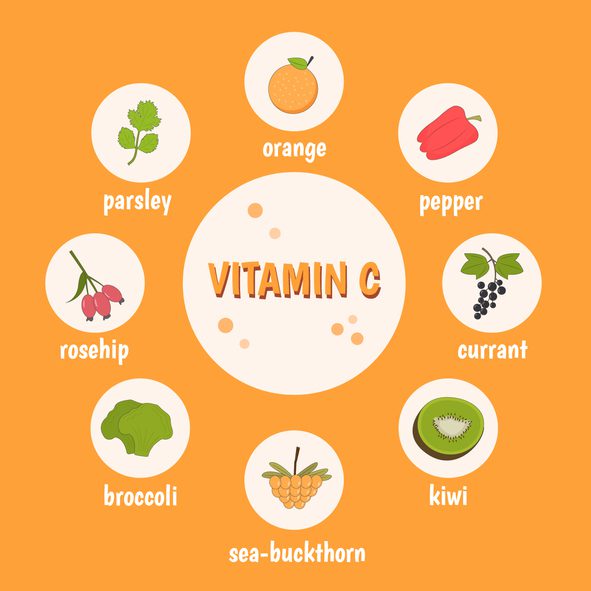
Vitamin C efficacy, recommended daily amount, food, side effects
What is Vitamin C?

Vitamin C is an essential nutrient that our body cannot produce naturally. Thus, it must be consumed externally. This vitamin is particularly abundant in fruits and vegetables and is crucial for various functions in our bodies.
Major Benefits of Vitamin C
Boosting Immune System
Vitamin C plays a vital role in strengthening the immune system. It helps protect us from pathogens like viruses and bacteria.
Antioxidant Action
As a potent antioxidant, vitamin C protects our cells from harmful molecules called free radicals. This can reduce the risk of developing chronic diseases.
Supporting Collagen Production
Collagen is essential for maintaining healthy skin, blood vessels, muscles, and cartilage. Vitamin C supports the production of this protein, helping to maintain healthy skin and tissue structure.

Symptoms When Lacking Vitamin C
When you lack vitamin C, you may experience symptoms such as:
- Fatigue & Energy Loss: One of the first and most common symptoms is fatigue. A deficiency in vitamin C can lead to problems with energy production resulting in a lack of energy needed for daily activities.
- Severe Stress Reaction: Vitamin C plays an important role in managing cortisol – the stress hormone.
(Continued…)
- Decreased Resistance & Frequent Cold: As vitamin C plays an important role in supporting the immune system; its deficiency could weaken your resistance making you more susceptible to diseases like colds.
- Slow Wound Healing: Vitamin-C is essential for healing wounds and regenerating skin & tissues so if there’s a deficiency it could lead to prolonged wound or scar healing time.
If these symptoms appear it would be wise to consult with professionals who may recommend adjusting your intake via supplements if necessary.

Importance Of Vitamin-C
Vitamin-C performs various functions within our body making it extremely important—it strengthens our immune system protecting us from pathogens; its antioxidant action protects cells; assists collagen production among other roles crucial for maintaining health within our bodies.
Moreover known to reduce risks associated with several chronic diseases such as heart disease hypertension stroke etc., consuming sufficient amounts of vitamin-C becomes very important due to these diverse reasons.

Conclusion
Vitamin-C—an essential nutrient involved with multiple biological processes within human bodies—cannot be produced by us hence needs external consumption typically through fruits/vegetables etc., meeting daily recommended dose (90mg/day men 75mg/day women).
While this requirement can usually be met through diet (fruits/vegetables), when not possible considering taking supplements could help however they should not replace basic meals but supplement them—balanced diet healthy lifestyle habits still remain most crucial aspects towards maintaining health overall!
To share some tips on consuming sufficient amounts:
- Consume Variety Of Foods Rich In VitC: Oranges kiwis pineapples strawberries along with broccoli bell peppers etc.—consume variety ensuring ample intake!
- Pay Attention To Cooking Method: VitC being heat-sensitive gets lost during cooking hence eating fresh or cooking briefly (boiling/stirring) would help retain its content!
- Use Of VitC Supplements: When not possible through diet alone supplements could be considered but remember they’re just that—supplements! Basic meals exercise sufficient rest etc., remain most important!
Let’s all take more interest in our health maintaining balanced nutritional diet along with appropriate lifestyle habits daily towards leading a healthy life
With the right balance of nutrients, we can boost our immune system and improve our overall health. Remember, the importance of vitamin C cannot be stressed enough: “An essential nutrient with various roles in our bodies, make sure to keep enjoying its benefits by managing your diet and lifestyle effectively!”

How to Maintain Adequate Vitamin C Levels
Here are some additional tips to maintain healthy vitamin C levels:
- Avoid Over-processing Foods: Over-processing food may lead to loss of nutrients, including vitamin C. To ensure you obtain the maximum nutritional value from your meals, try to prioritize whole foods and minimize the use of heavily processed ingredients.
- Stay Updated on Research &️ Recommendations: Health guidelines and research are always evolving. Stay updated on the latest studies and official recommendations regarding vitamin C intake to ensure you are consuming the most appropriate amounts.
- Seek Expert Advice When Necessary: If you’re unsure about your vitamin C intake, don’t hesitate to consult with a professional such as a nutritionist, dietitian, or your primary care physician. They can provide individualized advice tailored to your specific needs and lifestyle.

In Summary
Vitamin C is an essential nutrient that serves an array of important functions within our bodies. By consuming a balanced diet consisting of various fruits and vegetables, we can ensure that we maintain adequate vitamin C levels. In some cases, supplements may be used to complement our diets; however, they should not replace nutritious meals or well-maintained lifestyles.
By prioritizing vitamin C intake, we can work towards supporting our immune systems, maintaining healthy skin and tissue structure, and potentially reducing the risk of chronic diseases. Remember the key to a healthy life: consume a well-balanced diet, maintain an active lifestyle, and stay informed about the nutrients that are vital to your well-being, like vitamin C.
Stroke Treatment: Exploring Advanced Techniques and Approaches
Understanding Stroke: Causes, Symptoms, Prevention, and Treatment




